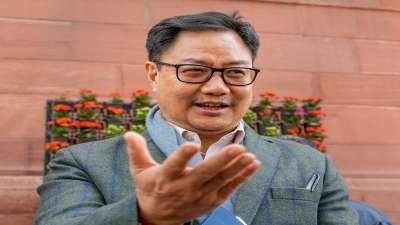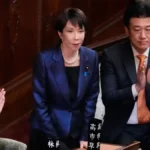Kiren Rijiju Gets Additional Charge After Pashupati Kumar Paras Resigns from Union Cabinet
In a recent development within the Union Cabinet, Kiren Rijiju, the Minister of Law and Justice, has been entrusted with an additional charge following the resignation of Pashupati Kumar Paras. The political landscape of the Union Cabinet witnessed a notable shift as Paras, who held the portfolio of Minister of Food Processing Industries, tendered his resignation, prompting the allocation of his responsibilities to Rijiju.
This move comes amidst a series of strategic adjustments within the cabinet, marking a pivotal moment in the administration’s tenure. With Rijiju’s expanded role, significant changes are anticipated in the dynamics of governance, particularly in the domains of law, justice, and now, food processing industries.
Rijiju, known for his astute leadership and commitment to public service, faces the daunting task of shouldering additional responsibilities while ensuring the seamless continuity of governmental functions. His appointment reflects the government’s confidence in his capabilities to navigate complex challenges and drive meaningful reforms across diverse sectors.
The decision to entrust Rijiju with an additional charge underscores the government’s resolve to maintain stability and efficiency within the cabinet amidst evolving political scenarios. As the nation grapples with multifaceted issues ranging from economic revival to social welfare, Rijiju’s stewardship assumes paramount importance in steering the nation towards progress and prosperity.
In conclusion, the elevation of Kiren Rijiju to an expanded role within the Union Cabinet following Pashupati Kumar Paras’ resignation heralds a new chapter in India’s political landscape. It signals the government’s proactive approach in addressing governance challenges and underscores its commitment to effective leadership and administrative resilience.

Why this News is Important
Significance of Kiren Rijiju’s Additional Charge
The announcement of Kiren Rijiju assuming additional responsibilities within the Union Cabinet carries significant implications for the political and administrative spheres. This development underscores several key aspects.
Political Realignments:
The resignation of Pashupati Kumar Paras and the subsequent allocation of his portfolio to Kiren Rijiju highlight ongoing political realignments within the ruling party and the Union Cabinet. Such changes often reflect strategic maneuvers aimed at consolidating power and addressing internal dynamics within the political landscape.
Administrative Continuity:
With Rijiju’s appointment, ensuring administrative continuity becomes paramount. The seamless transition of responsibilities ensures that crucial government functions are not disrupted, maintaining stability and efficiency in governance processes.
Leadership Evaluation:
Rijiju’s elevation provides an opportunity to evaluate his leadership capabilities in managing diverse portfolios. It offers insights into the government’s assessment of his competence and effectiveness in handling complex administrative challenges.
Policy Implications:
The redistribution of ministerial responsibilities may signal potential shifts in policy priorities. Rijiju’s expanded role could influence policy decisions, particularly in the domains of law, justice, and food processing industries, impacting various stakeholders and sectors.
Public Perception:
This development also influences public perception of the government’s decision-making processes and its responsiveness to changing circumstances. It shapes narratives surrounding governance effectiveness and leadership accountability.
Historical Context
Background to the Resignation and Appointment
The resignation of Pashupati Kumar Paras and the subsequent assignment of additional responsibilities to Kiren Rijiju mark a significant moment in the ongoing political narrative of the Union Cabinet. Such transitions are not uncommon in the realm of Indian politics, often driven by a confluence of factors ranging from internal party dynamics to strategic realignments within the government.
Previous Instances of Cabinet Reshuffles:
Historically, Indian governments have witnessed periodic reshuffles within the Union Cabinet to address evolving political and administrative challenges. These reshuffles are often characterized by the induction of new ministers, the reallocation of portfolios, and sometimes, the resignation of incumbent ministers.
Political Context:
In the current context, the resignation of Pashupati Kumar Paras may be viewed within the broader framework of internal party dynamics and coalition politics. Such resignations, whether voluntary or under pressure, often reflect underlying tensions or strategic maneuvers within political parties and alliances.
Administrative Continuity and Stability:
Amidst these political shifts, ensuring administrative continuity and stability remains a priority for the government. The seamless transfer of responsibilities from one minister to another is essential to maintain governance efficacy and public confidence in the administration’s ability to govern effectively.
Implications for Governance:
The historical context surrounding ministerial resignations and appointments offers insights into the broader implications for governance and policy implementation. It underscores the fluid nature of political dynamics and the adaptability required to navigate through changing circumstances effectively.
5 Key Takeaways from “Kiren Rijiju Gets Additional Charge After Pashupati Kumar Paras Resigns from Union Cabinet”
| Serial Number | Key Takeaway |
|---|---|
| 1. | Kiren Rijiju has been assigned additional responsibilities in the Union Cabinet following Pashupati Kumar Paras’ resignation. |
| 2. | Rijiju’s expanded role includes overseeing the Ministry of Food Processing Industries, in addition to his existing portfolio as Minister of Law and Justice. |
| 3. | The reallocation of ministerial responsibilities reflects ongoing political realignments within the ruling party and the Union Cabinet. |
| 4. | This development underscores the government’s commitment to ensuring administrative continuity and stability amidst evolving political scenarios. |
| 5. | Rijiju’s appointment provides insights into the government’s assessment of his leadership capabilities and effectiveness in managing diverse portfolios. |
Important FAQs for Students from this News
1. What prompted Pashupati Kumar Paras to resign from the Union Cabinet?
Answer: The reasons behind Pashupati Kumar Paras’ resignation are not explicitly stated in the news article. However, resignations from ministerial positions can be influenced by a variety of factors including personal reasons, political dynamics, or disagreements with government policies.
2. How will Kiren Rijiju’s additional responsibilities impact governance?
Answer: Kiren Rijiju’s expanded role within the Union Cabinet may lead to changes in policy implementation, particularly in the sectors of law, justice, and food processing industries. His leadership in these areas could shape government initiatives and decisions affecting various stakeholders.
3. What challenges might Kiren Rijiju face in his new role?
Answer: Rijiju may encounter challenges related to balancing multiple portfolios, addressing sector-specific issues, and ensuring effective coordination within the ministries under his purview. Additionally, managing public expectations and navigating political complexities could pose significant hurdles.
4. How do ministerial reshuffles impact governance continuity?
Answer: Ministerial reshuffles, like the one described in the article, can disrupt administrative continuity if not managed effectively. However, the seamless transfer of responsibilities aims to minimize disruptions and maintain stability within the government’s functioning.
5. What implications does this news have for aspirants of government exams?
Answer: Aspirants of government exams should stay informed about current affairs, including ministerial appointments and resignations. Understanding these developments provides valuable insights into the political landscape and governance dynamics, which may be relevant for exam preparation.
Some Important Current Affairs Links

















